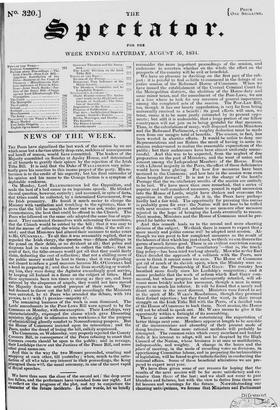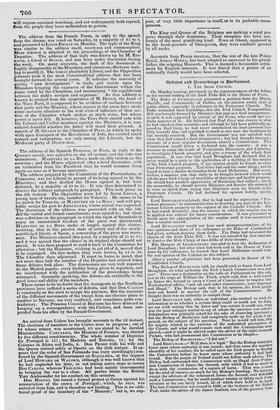We have thus seen the close of the second act
:' the drop scene has fallen, and the performers have vanished from our sight. Let as reflect on the progress of the plot, and try to conjecture the vharacter of the future incidents. In other words, let us briefly
reconsider the more important proceedings of the session, and endeavour to ascertain whether on the whole the effect on the prospects of the country will be evil or beneficial. We have no pleasure in dwelling on the first part of' the sub- ject : it is painful to find so little to commend in the doings of an
entire session of the Reformed House of Commons. When we have named the establishment of the Central Criminal Court for the Metropolitan districts, the abolition of the House-duty and some minor taxes, and the amendment of the Poor-Laws, we are at a loss where to look for any measure of general importance among the completed acts of the session. The Poor-Law Bill, too, though it has our hearty approbation, is very far from being universally received as a benefit: its good effects will soon, we trust, cause it to be more justly estimated by its present oppo- nents; but still it is undeniable, that a large portion of our fellow countrymen will not join us in being grateful for that measure. Thus, in the calculations of many, well disposed towards Ministers and the Reformed Parliament, a weighty deduction must be made even from our meagre total of benefits. The session, in fact, has been wasted in abortive efforts. It would be unfair to deny our Representatives and our Rulers the merit of having in some in- stances endeavoured to realize the reasonable expectations of the public; but their endeavours have been almost uniformly unsuc- cessful. And this was to be expected, from the neglect of due preparation on the part of Ministers, and the want of union and concert among the Independent Members of the House. Even with a Liberal majority in the Peers, the effect of these deficiencies would have been glaring. For how few measures have been matured in the Commons; and how late in the session were even those brought forward! It is not to the charge of the hostile Peerage that the unsatisfactory results of the session are entirely to be laid. We have more than once remarked, that a series of popular and well-considered measures, poured in rapid succession into the House of Lords, might have shaken and overcome the opposition in that quarter. As it is, the Peers have perhaps hardly had a fair trial. The opportunity for pursuing this course is probably gone for ever : the Nation will not bear to be trilled with next session—will not endure to see measure after measure rejected in the hope of bringing the Lords eventually to reason. Next session, Ministers and the House of Commons must be pre- pared for bolder work. And this remark leads us to the second and more cheering division of the subject. We think there is reason to expect that a more manly and politic course will be adopted next session. Al- though we can point to few completed measures as the result of the labours of that which has just closed, we think we can discern the germs of much future good. There is an evident conviction among our Representatives, that the "conciliatory "—that is, the truck- ling policy—has been tried too long already. Men who nyder Earl GREY' dreaded the approach of a collision with the Peers, now seem to think it cannot come too soon. The House of Commons got rid of much of its slavish spirit, when the Ministry were re- lieved from the Premiership of Earl GREY. The country has breathed more freely since his Lordship's resignation ; and it seems probable that the work of reform which Earl GREY com- menced, but whose progress he subsequently retarded, will ad- vance more briskly under his successor, though a man in many respects so much his inferior. It will be found that a manly and direct course is the most discreet. Ministers were forced to act in the spirit of Mr. WARD'S Resolutions, though they procured their formal rejection ; but they found the want, in their recent struggle on the Irish Tithe Bill with the Peers, of a decided vote Of the House of Commons to back them. Next session, the House will not be afraid to speak out. Mr. WARD means to give it the
opportunity within a fortnight of its assembling. .
There is another reason for entertaining the expectation of better things next year. Members appear at length to be sensible of the inconvenience and absurdity of their present mode of doing business. Some more rational methods will probably be attempted. -The common rules which every merchant and banker finds it his interest to adopt, will not be despised by the High Council of the Nation, whose business is at once so multifarious,
indispensable, and weighty. A change in the hours and the place of meeting, in the mode of recording votes on divisions, in apportioning Committee labour, and in preparing the technicalities of legislation, will be found to give infinite facility in conducting the national affairs. Some of these beneficial alterations we are pre- pared to expect next year.
We have thus given some of our reasons for hoping that the results of the next session will be far more satisfactory and ex-
tensive than those of the last ; and we shall not recur to past blunders and failures, but with the view to derive from them use- ful lessons and warnings for the future. Notwithstanding our chcering anticipations, we foresoe that Ministers and Parliament Di ft .011 tIt
will require constant watching, and not unfrequently bold reproof, from the people they have undertaken to govern.



















